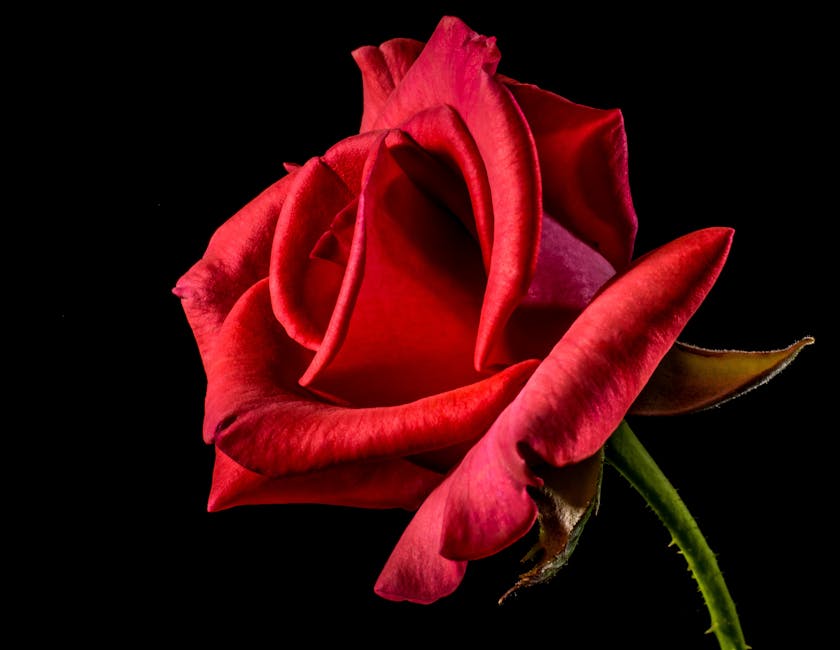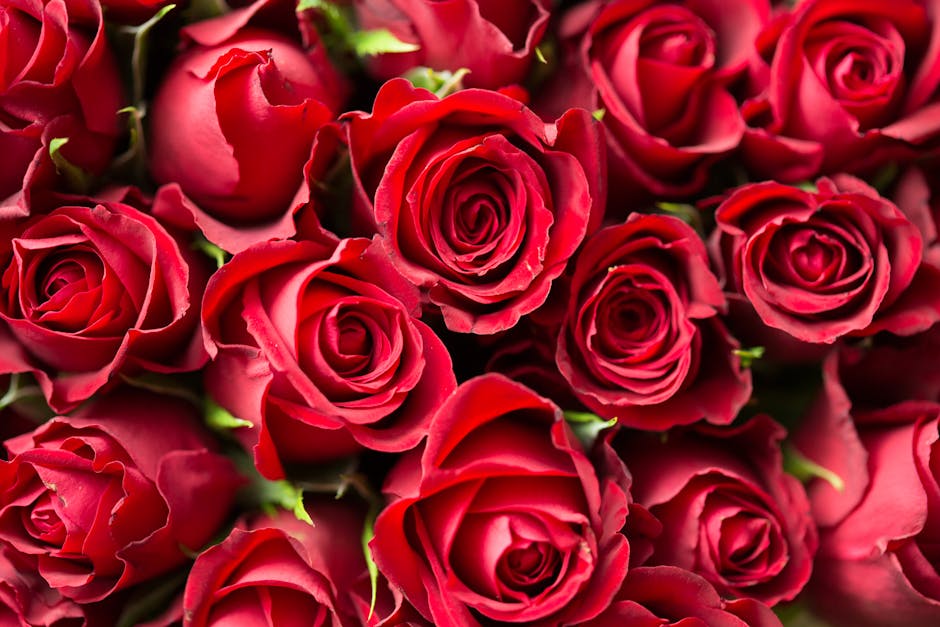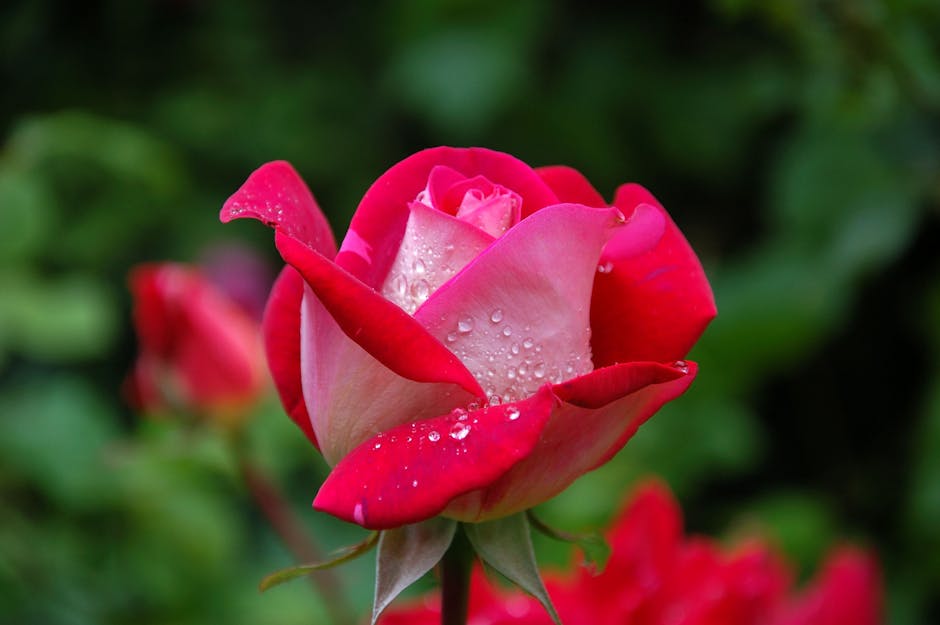Roses, with their fragrant petals and vibrant hues, have captivated hearts for centuries. Their beauty inspires countless poets to weave words into enchanting tales about their essence. Poems about roses delve into the captivating aroma, the fragile stems, and the graceful movements of these graceful flowers. Each verse offers a unique perspective on their unparalleled charm and significance in human experiences. In these poems, roses emerge as symbols of love, longing, beauty, and renewal.
25 Timeless Poems about Roses
Rose Petal Whispers
Softly falls the morning dew
On petals delicate and pale
A gentle hue that’s new
A rose’s beauty starts to prevail
The Thorn of Love
Prickly exterior, soft within
Guarding the heart that beats for you
A symbol of love that begins
With passion’s fires that forever shine
Rose-Tinted Memories
In grandma’s garden, I would play
Among the roses, on sunny days
Their sweet fragrance wafted my way
As I chased butterflies and laughter’s sway
Email to the Rose Queen
Dear Rose, oh fair and bright
How I adore your beauty’s light
In gardens, bouquets, or just in sight
You reign supreme, a royal delight
A Rose in Winter
Frosty mornings, icy air
The rose bush stands, its beauty bare
But even snow can’t hide its charm
For love and beauty never really disarm
The Language of Roses
In ancient times, a secret code
The rose’s color, a message to abode
Red for love, pink for friendship true
A bouquet’s silent language, speaking anew
Roses on My Grave
When I’m gone, and my story’s told
Plant roses on my grave, so cold
Let their beauty, my memory hold
And in their scent, my love forever unfold
Rose-Colored Glasses
The world looks brighter, more divine
Through rose-colored lenses, I redefine
The beauty in life, the love that’s mine
A world of wonder, a heart that’s aligned
Enjoying these poems? You can also create your own poems with our Advanced AI Poem Generator.
Roses Red, Roses Gold
In twilight’s hush, where shadows play,
Roses bloom, their beauty sway,
Like fiery suns, their petals shine,
A fleeting glance, a love divine.
Their velvet soft, their scent so sweet,
A whispered promise, to our feet,
The world’s desire, in rose’s hue,
A dream we chase, anew.
Petal Whisperings
Softly whispers the rose’s song,
A gentle breeze, its secrets bring,
In whispers, truth and love are told,
In petals, wisdom, young and old.
The rose’s heart, a mystic sea,
Where dreams and truth, in harmony,
A dance of petals, soft and slow,
In silence, wisdom, as we know.
Roses in the Rain
Raindrops cling, like tears to eyes,
To rose’s petals, soft surprise,
Their stems, like arms, embracing tight,
A lover’s hold, through rain’s cold light.
Their beauty weeps, in rain’s descent,
A melancholy, in persistence,
A promise kept, through stormy night,
A rose’s vow, in morning’s first light.
Burning Roses
In fiery passion, burning bright,
A rose’s flame, where love takes flight,
Like burning lava, hot and strong,
A fierce devotion, where hearts belong.
In fiery rose, our love’s reborn,
In burning hearts, our passions sworn,
Through love’s fierce fire, we rise anew,
In burning roses, our love shines through.
Whispers of Dawn
Roses bloom in secret now,
As morning sunbeams start to flow,
The dew-kissed petals unfold,
A gentle whisper, whispered low.
In colors of devotion’s hue,
The rose garden’s mystic vows,
To love, to life, and all anew,
Echoing whispers, yet to be told.
Ephemeral Beauty
In petals soft as silk, she lies,
A fleeting beauty, yet divine,
The rose, a symbol of the skies,
Ephemeral, yet forever mine.
With every sigh, her strength declines,
In beauty’s armor, fragility shines,
Yet in her brief, shorn life span’s lines,
Ephemeral beauty reigns, sublime.
Roses Weep Not
Like ravens, roses hold our secrets dear,
In petals black and red, like ancient tears,
For every love that’s lived, has lived, or will,
Roses weep not, yet in silence, still.
We find solace there, among the thorns,
A sanctuary, where hearts are reborn,
Yet, with each rose that blooms and falls,
Roses weep not, behind iron walls.
One Tender Touch
Like fingers tracing love’s gentle curve,
One tender touch can set hearts free,
For in the rose’s soft, downy verge,
A whispered promise, meant just for me.
Within the petals, a story told,
Of love’s brief window, where hearts unfold,
That fleeting moment, when love takes root,
One tender touch, forever to loot.
Roses Answer Not
Roses answer not, to voiceless cries,
Like desert sands, their silence glides,
No whispers rise, from crimson lips,
No soft confessions, nor tender grips.
For in their silence, they hold our deepest fears,
Yet in their beauty, our soul’s clarity clears,
Roses answer not, to love’s despair,
Yet in their quiet, we find our prayer.
Velvet Night’s Embrace
In gardens of the gentle midnight,
Where moonlight softly treads,
A thousand roses ‘neath her light
In slumber silently spread.
Their fragrant whispers on the breeze
Entwine with silver beams,
As shadows dance upon their leaves
In dreams of sunlit streams.
The cool earth cradles each soft bloom,
As velvet night descends,
And in their silence, roses croon
An ancient serenade.
The Scarlet Song
A crimson rose, with fiery heart,
In radiance thrives and glows,
Upon its petals, passions impart,
As zestful breezes blow.
Its vibrant hues, a song ignite,
Of love and longing fierce,
A symphony of ardor’s might,
In every petal near.
The thorns, a testament of strife,
Encircle beauty’s core,
Yet undeterred, the bloom embraces life,
A vibrant lore to store.
The Garden’s Sentinel
In quietude, the watchful rose
A vigil keeps with care,
With thorns as arms and colors bold,
No danger shall come near.
A sentinel amidst the flora,
Its silent vows abide,
In rosy hue and verdant grace,
Its strength forever wide.
Each petal soft and dew-kissed morn,
Bears witness to the night,
And in the dawn, with golden glee,
Stands resolute and bright.
Blushing Secrets
In gardens where the sunbeams play,
A whispered secret blooms,
A rosy tale that gently twirls,
And shyly meets the gloom.
The blushing rose, with cheeks ablaze,
Conceals a gentle soul,
Where whispered secrets softly sway,
And kindred spirits stroll.
In soft embrace, a tender breeze,
Enfolds the rosy heart,
As whispered secrets, gently tease,
And leave an imprint there.
The Poet’s Muse
Upon the canvas of my thoughts,
The rose reveals her face,
An artist’s dream in every stroke,
A warm embrace in lace.
Her scarlet arms entwine my mind,
And thoughts like fragrant blooms,
In gardens of my heart design,
The poet’s sweetest doom.
In rosy hues, a tapestry,
Of tender thoughts unfolds,
Where silent whispers sing in rhyme,
And stories are consoled.
Echoes of the Past
A rose, the relic of a time,
Where heartbeats pulsed as one,
In gardens of a love once thine,
A memory’s sweet rebirth begun.
Upon each petal’s timeworn grace,
A tale of passion lies,
Where echoes of the past embrace,
And longing skies arise.
In gardens of the heart, entwined,
Where love’s sweet dreams reside,
The rose, the jewel, love refined,
In secrets kept inside.
The Language of the Heart
A rose’s allure in vermeil hue,
The language of the heart,
In every petal’s silken sheen,
A sonnet’s gentle start.
With ardor blazing in its core,
In rosy tones it speaks,
A tale of love that doth endure,
And timeless promises it keeps.
And thus, the rose, in silent grace,
Reveals the heart’s sweet tale,
Where love and longing find embrace,
In quietude prevail.
Most Popular Poems About Roses
The Sick Rose by William Blake
This poem is a beautiful and haunting exploration of the rose as a symbol of love, beauty, and decay. Blake’s vivid imagery and metaphors create a sense of foreboding and despair, as the rose is corrupted by an unseen force. The poem is a stunning example of Blake’s unique and mystical style, and its exploration of the darker side of love and beauty continues to captivate readers to this day.
The Rose Family by Robert Frost
In this charming and accessible poem, Frost explores the rose as a symbol of family and relationships. Through a series of gentle and humorous vignettes, Frost reveals the ways in which the rose can bring people together, even as it also highlights the imperfections and conflicts that arise in any family. The poem is a delightful celebration of the beauty and complexity of human relationships.
To the Rose Upon the Rood of Time by W.B. Yeats
This poem is a beautiful and mystical exploration of the rose as a symbol of beauty, love, and transience. Yeats’ rich and evocative language creates a sense of dreamlike wonder, as the speaker meditates on the rose’s fleeting beauty and the passing of time. The poem is a stunning example of Yeats’ unique blend of mysticism and Romanticism.
The Rose by Tomas Tranströmer
In this quiet and contemplative poem, Tranströmer explores the rose as a symbol of solitude and inner reflection. Through a series of subtle and evocative images, Tranströmer creates a sense of stillness and calm, as the speaker meditates on the rose’s simple yet profound beauty. The poem is a beautiful example of Tranströmer’s unique and introspective style.
Do Roses Like to Be Touched? by Mary Oliver
In this delightful and whimsical poem, Oliver explores the rose as a symbol of sensuality and intimacy. Through a series of playful and imaginative vignettes, Oliver reveals the ways in which the rose can be a source of pleasure and joy, even as it also highlights the importance of gentle and respectful touch. The poem is a charming celebration of the beauty and wonder of the natural world.
A Red, Red Rose by Robert Burns
This classic poem is a beautiful and passionate exploration of the rose as a symbol of love and devotion. Burns’ rich and sensual language creates a sense of urgency and intensity, as the speaker declares their eternal love for the beloved. The poem is a stunning example of Burns’ unique blend of Romanticism and folk tradition.
The Rose Is Obstinate by Sylvia Plath
In this intense and provocative poem, Plath explores the rose as a symbol of resistance and defiance. Through a series of vivid and unsettling images, Plath reveals the ways in which the rose can be a source of both beauty and danger, even as it also highlights the speaker’s own inner turmoil and emotional struggle. The poem is a powerful example of Plath’s unique and unflinching style.
Ode to a Rose by Pablo Neruda
This beautiful and sensual poem is a stunning celebration of the rose as a symbol of love and desire. Neruda’s rich and evocative language creates a sense of intoxication and abandon, as the speaker declares their passion for the beloved. The poem is a classic example of Neruda’s unique blend of Romanticism and eroticism.
Roses Only by Marianne Moore
In this intricate and enigmatic poem, Moore explores the rose as a symbol of complexity and ambiguity. Through a series of subtle and suggestive images, Moore reveals the ways in which the rose can be both beautiful and thorny, even as it also highlights the speaker’s own inner contradictions and conflicts. The poem is a stunning example of Moore’s unique and modernist style.
The New Colossus by Emma Lazarus
This sonnet is a powerful and iconic exploration of the rose as a symbol of freedom and liberty. Through a series of vivid and patriotic images, Lazarus reveals the ways in which the rose can represent the highest ideals of humanity, even as it also highlights the struggles and challenges of the human experience. The poem is a beautiful example of Lazarus’ unique blend of Romanticism and social justice.
The Eternal Symbolism of Roses in Poetry
Roses, with their alluring beauty and captivating scent, have long been a popular subject in poetry. They are often used as a symbol of love, passion, and beauty, making them the perfect muse for poets throughout history. This article explores the various aspects of poetry about roses, delving into their symbolism, historical significance, and the different emotions they evoke in poets and readers alike.
Symbolism of Roses in Poetry
Roses are imbued with deep symbolism in poetry, representing various concepts and emotions. The color of the rose itself often determines its meaning:
- Red roses: Romantic love, passion, and desire
- White roses: Purity, innocence, and spirituality
- Yellow roses: Friendship, joy, and optimism
- Pink roses: Gratitude, admiration, and grace
Poets employ these symbolic meanings to convey complex emotions and ideas, allowing them to express themselves more eloquently and deeply.
Historical Significance of Roses in Poetry
Roses have been celebrated in poetry for centuries, dating back to ancient civilizations such as Greece and Rome. Poets like Sappho and Anacreon wrote of roses’ enchanting allure, while Roman poet Catullus penned one of the most famous rose poems, “Lesbia cum ita nocturna,” which explores the themes of love and betrayal.
In the Middle Ages, roses continued to be a popular subject in poetry, particularly within the context of courtly love and chivalry. The Roman de la Rose, a 13th-century French poem, is a prime example of this, using the metaphor of a rose to represent an unattainable lover.
The Romantic poets of the 18th and 19th centuries, such as William Wordsworth, John Keats, and Percy Bysshe Shelley, also frequently wrote about roses, using them to convey their deep emotions and appreciation for nature.
The Language of Roses in Poetry
Poets often employ rich, evocative language to describe roses, using sensory details to bring their beauty to life. They focus on the rose’s scent, color, texture, and shape, immersing readers in a vivid sensory experience.
For instance, in his poem “The Rose,” William Blake writes:
O Rose, thou art sick!
The invisible worm
That flies in the night,
In the howling storm,Has found out thy bed
Of crimson joy,
And his dark secret love
Does thy life destroy.
Blake’s use of vivid imagery and personification highlights the rose’s symbolic connection to love and passion, while also emphasizing its fragility and vulnerability.
The Emotional Power of Roses in Poetry
Roses have the power to evoke strong emotions in both the poet and the reader. They can symbolize joy, love, and beauty, but they can also represent pain, loss, and longing.
In “When I Have Fears,” John Keats writes:
When I have fears that I may cease to be
Before my pen has glean’d my teeming brain,
Before high-piled books, in charactery,
Hold like rich garners the full-ripen’d grain;When I behold, upon the night’s starred face,
Huge cloudy symbols of a high romance,
And think that I may never live to trace
Their shadows, with the magic hand of chance;And when I feel, fair creature of an hour,
That I shall never look upon thee more,
Never have relish in the faery power
Of unchang’d brow, blest continuance more;
Keats’s use of roses as a symbol of beauty and fleeting pleasure underscores the profound emotional impact they can have on the human experience.
The Enduring Appeal of Roses in Poetry
Roses continue to captivate poets and readers alike due to their timeless beauty and emotional resonance. They represent the complexity of human emotions, serving as a powerful symbol for love, loss, and the fragility of life. As such, roses will undoubtedly remain a popular subject in poetry for centuries to come.



